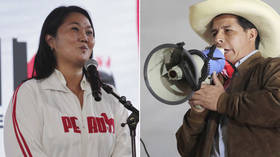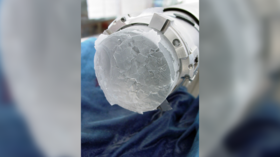Tense vote count in Peru sees deeply contrasting candidates in nose-to-nose race for presidency

The second round of presidential elections in Peru failed to produce a clear victor on Sunday, with less than half a percent between Keiko Fujimori of right-wing Fuerza Popular and her left-wing rival Pedro Castillo of Peru Libre.
By Monday afternoon, with 95% of the ballots counted, Castillo had pulled ahead by 74,636 votes, or 50.22% to Fujimori’s 49.78%. Previously, at 90% of all ballots counted, Fujimori had 50.35% of the vote over Castillo’s 49.64%, leading by about 114,000. The counting process continues.
Peru has 23.7 million eligible voters, and the turnout on Sunday amounted to 76.1%, with over 18 million casting their ballots, and 16,928,470 accepted as valid.
Information from the rural areas of Peru, which favor Castillo, tend to arrive later for processing. The candidate called on his supporters to “stay vigilant” and make sure that every vote is tabulated.
Estas son las caricaturas de Carlos Lavida y de Dilbert publicadas en la edición de hoy del diario Gestión. https://t.co/QTUjCmPImQ
— Diario Gestión (@Gestionpe) June 7, 2021
The nail-biting count, which was predicted by opinion polls ahead of the ballot, further perpetuates political uncertainty in the Latin American country. The two candidates offered vastly different futures to electors.
Castillo, a union organizer and rural teacher, is an avowed left-wing socialist who wants to nationalize companies in key sectors of the economy such as mining, hydropower, and communications. He says it will help Peru reclaim economic sovereignty and reduce wealth inequality in the country.
Fujimori is a devoted defender of neoliberal economics and other right-wing policies of her father, former President Alberto Fujimori. She ran on a promise to deregulate the economy to attract private investment. Also a law-and-order candidate, she said she would pardon her dad, who is serving a jail term on charges of corruption and abuse of human rights committed during his reign.
Also on rt.com Peru almost TRIPLES its Covid-19 death toll after revising counting method a week before key electionThe election day came shortly after the devastation inflicted on Peru by Covid-19 was highlighted by the government’s decision to revise the official death toll from the disease. The figure almost tripled once many of the fatalities without a confirmed test for the infection were included in the tally.
The two election finalists emerged from a crowded field of 18 candidates, who participated in the first round of presidential election in April. At that time, Castillo came first with 18.9 percent of the vote, compared to Fujimori’s 13.4 percent.
With the outcome of the second round undecided, some people joked that it was high time for Juan Guaido to swoop in and declare himself the legitimate president of Peru. The US-backed Venezuelan politician infamously laid a claim to presidentship in his own country, but failed to actually install himself in Caracas despite numerous attempts to do so.
BREAKING NEWS: Due to election uncertainty in Peru Juan Guaidó has declared himself president of Peru. pic.twitter.com/4TNowGvHza
— Lefty (@leftyandzesty) June 7, 2021
Whichever candidate finally takes the helm, they are not certain to remain in power for the entire five-year term. Martin Vizcarra, who narrowly defeated Fujimori in the 2016 election, was removed from office in November 2020.
The Peruvian presidency has been in turmoil since then. Protesters alleged that the Peruvian Congress reinterpreted the “moral incapacity” clause of the constitution to de facto impeach Vizcarra in a “coup.” Interim president Manuel Merino resigned less than a week later, after two people died and dozens were injured during the protests. He was replaced by Francisco Sagasti, a former World Bank and Davos adviser.
The centrist Partido Morado (Purple Party) nominated Sagasti as running mate to its leader Julio Guzman, but their ticket came in 10th in the first round of the presidential election in April, with 2.26% of the vote.
Like this story? Share it with a friend!














